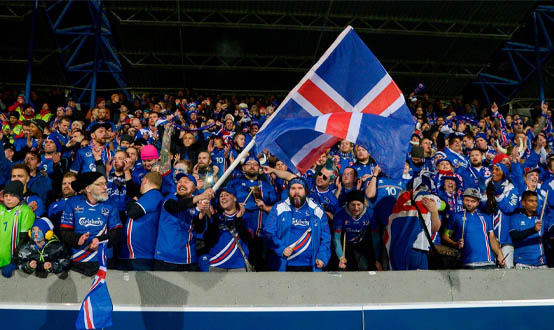Why the Iceland National Team Has So Many Polish Fans
Contact a local for insider travel information and personal recomendations

Among the dedicated fans who will be filling Reykjavík’s squares, parks, and pubs to cheer on Iceland during its first-ever FIFA World Cup appearance is a surprising group: native Poles for whom Iceland is their second home.
“I think generally [a sport like] football is important for foreigners in Iceland because it lets us adjust and find our ways in the community to function,” says 39-year-old Tomasz Kwiatkowski, who has been living in Iceland for the past 10 years.
Kwiatkowski is one of Iceland’s nearly 12,000 Polish immigrants. For more than 20 years, Poles have been the largest immigrant group in Iceland, a country with a population of just 350,170, making it the smallest nation to compete in the 2018 FIFA World Cup. And while Poles will be cheering for the Poland team, which also plays in this year's games, many will be watching Iceland just as closely.
Poles immigrated to Iceland largely for financial reasons and job opportunities, particularly in 2006, when Iceland’s economic expansion was in full throttle and work in the construction sector was plentiful. While some Polish immigrants planned to get their start in Iceland and save money before returning home, the community continued to grow—and with it their love of Icelandic football.
When you live somewhere for a certain amount of time, you begin to identify with the country, Kwiatkowski says. “There are also... values that [Poles] have in common with Icelanders, like bravery, and never giving up,” he adds. “The Iceland national team represents these values.”
Iceland-based Piotr Giedyk is the founder of Piłkarska Islandia, or Football Iceland, a fan club and digital community of Poles who love Icelandic football. Giedyk founded the club in August 2013, and he set up fan pages on Facebook and Twitter for members to talk strategy, discuss tactics, and share their love for the team. In five years, Piłkarska Islandia’s Facebook page has grown to upwards of 5,500 followers—and more than three-quarters join the conversation from Poland, with a substantial base in Warsaw.
Iceland emerged as the unsuspecting challenger during the qualifying rounds for the 2016 UEFA European Championship, or Euro 2016, further fuelling Polish infatuation, Giedyk says. In fact, members of Piłkarska Islandia traveled to the Czech Republic to cheer Iceland on as it powered through to land a spot in Europe’s biggest soccer tournament. The island nation went on to rock the continent when its team beat England 2-1, advancing to the quarterfinals against France. Though its face-off with the French ended in a 5-2 loss, the team won respect and high praise from football fans around the world.
It also won over the hearts of Poles—both in Iceland and back at home.
“[Iceland] has ambition, they have the fight—they are a small country with big... heart,” Giedyk says. “It's a completely different football game for us.”
Many Polish fans describe their admiration for what drives Iceland's players: patriotism, above all else. Unlike Poland, Spain, Italy, France, and other European countries, Iceland has players who are less recognizable and less influenced by the fame and fortune funneled into the sport. Every person on the team is important, and fans respect each player equally, Polish fans say.
“They give 150 percent for their nation, and each one of them will jump into the fire for the other,” Kwiatkowski says. “They don’t have a star on their team, but you can be sure that for 90 minutes you will have blood, sweat, and tears left on the field.”
It helps, too, that Iceland comes complete with beautiful scenery, creating what Giedyk says is a “football fairy tale.”
Grzegorz Rucinski has been living in Hafnarfjordur, Iceland, for the past 12 years and has seen close to 20 games at Reykjavik’s Laugardalsvollur Stadium. Each one was fantastic, he says. The crowds were loud, people were pounding drums, and the team’s fan section was electric. There is never an Iceland national team match where fans and supporters aren’t having fun, Rucinski adds.
“Iceland is already the winner,” Rucinski says.
As Kwiatkowski gets ready to tune in to the upcoming tournament, he thinks back to a 2009 FIFA World Cup qualifying match between Iceland and Holland, played in Reykjavik’s Laugardalsvollur Stadium. It was the first time he saw the Iceland team play, and he, too, instantly fell in love with the atmosphere. Holland supporters dressed up in Dutch costumes. Iceland fans—particularly Tólfan, the team's official supporter club—waved Iceland's flags and performed national claps and chants. After the game, the fans sat together, drinking beer and eating Icelandic hot dogs—a sausage made from lamb, pork, and beef then topped with fried and raw onions, brown mustard, and a mayonnaise-based sauce.
The energy and camaraderie were different from anything that Kwiatkowski had experienced before, and now he beams with pride as he welcomes another new experience on his resume as an Iceland fan: cheering Iceland on through its journey in Russia.
"Between Poland and Iceland, I'm going to have a lot of fun watching [the World Cup] this time," Kwiatkowski says.
Publish On : https://www.nationalgeographic.co.uk/history-and-c
